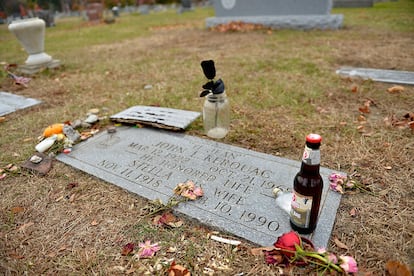Jack Kerouac, the Beat Generation’s self-made avatar
The American writer managed to establish himself as a unique character on and off the page with his masterpiece, ‘On The Road’

There is no better portrait than the one a man makes of himself: “Got an A from Mark Van Doren in English at Columbia (Shakespeare course). Flunked chemistry at Columbia. Had a 92 average at Horace Mann School (1939-40). Played football on varsities. Also track, baseball and Chess teams. Married: Nah. Summary of Principal Occupations and/or jobs: scullion on ships, gas station attendant, deckhand on ships, newspaper sportswriter (Lowell Sun), railroad brakeman, script synopsizer for 20th Century Fox in NY, soda jerk, railroad yardclerk, also railroad baggage handler, cotton picker, assistant furniture remover, sheet metal apprentice on the Pentagon in 1942, forest fire lookout 1956, construction laborer (1941)…” This is a fragment of what American writer Jack Kerouac wrote at the request of his publisher for the introduction to the anthology of travel essays entitled Lonesome Traveler.
Born in Massachusetts in 1922, Kerouac named the Beat Generation. His unorthodox take on life made it almost inevitable that he would become a legend. He began with his origins, more than once stating that his surname had survived the legacy of Baron François Louis Alexandre Lebris de Kerouac. And he went on to carve out the route that generations of young people and artists around the world would follow, in different ways and languages. Why wait for someone but Kerouac to talk about Kerouac? His work illustrates a deep-seated conviction that every legend must be written by the person involved, the protagonist. Only they will know what should stay and what should go – and what should be embroidered upon.
Unlike Dostoyevsky, Kerouac did not speed-write out of economic necessity, but rather to avoid losing his train of thought
Among all the anecdotes about his writing, none beats the one about how he produced the Beat generation’s bible, On the Road – a monumental book written in record time. Fyodor Dostoyevsky was similarly quick to produce The Gambler, though it was not his magnum opus. Of course, unlike Dostoyevsky, Kerouac did not speed-write out of economic necessity, but rather to avoid losing his train of thought. Kerouac fans will know that On the Road was written in a matter of 21 days; that to inspire the spontaneous prose used to describe his trips across the US and Mexico during 1947 and 1950, the author joined sheets of paper together with glue that he could roll up and roll out again in a bid to let the conscience unwind.
Few great novels have authors who manage to become characters in and of themselves. In the first review of On the Road, which was published by The New York Times on September 5, 1957 under the headline Books of The Times, critic Gilbert Millstein wrote: “This book requires exegesis and a detailing of background. It is possible that it will be condescended to by, or make uneasy, the neo-academicians and the ‘official’ avant-garde critics, and that it will be dealt with superficially as merely ‘absorbing’ or ‘intriguing’ or ‘picturesque’… But the fact is that On The Road is the most beautifully executed, the clearest and the most important utterance yet made by the generation Kerouac himself named years ago as ‘beat’ and whose principle avatar he is.”
The questions concerning the book itself, its author and a generation more interested in how to live than why – as Beat author John Clellon Holmes put it – are precisely what every reader or aspiring writer wants: a myth. A model. Kerouac, a figure so romanticized, is still not obsolete. Like few others, he managed to imbue his work with the idea of movement that went beyond the anecdote to become the essential axis of life; the importance of an instant precisely because of its ephemeral nature.
Kerouac will be remembered for the spontaneity of his writing, for his jazzy improvisation on paper; for the promiscuity of his narratives; for promoting Buddhism, the use of drugs and sexual freedom. For being, probably unwittingly, the ideologue for libertarian movements in the second half of the last century. But, above all, for becoming a myth alongside his work. According to Campbellian logic, Kerouac felt the call and merely answered it.
Tu suscripción se está usando en otro dispositivo
¿Quieres añadir otro usuario a tu suscripción?
Si continúas leyendo en este dispositivo, no se podrá leer en el otro.
FlechaTu suscripción se está usando en otro dispositivo y solo puedes acceder a EL PAÍS desde un dispositivo a la vez.
Si quieres compartir tu cuenta, cambia tu suscripción a la modalidad Premium, así podrás añadir otro usuario. Cada uno accederá con su propia cuenta de email, lo que os permitirá personalizar vuestra experiencia en EL PAÍS.
¿Tienes una suscripción de empresa? Accede aquí para contratar más cuentas.
En el caso de no saber quién está usando tu cuenta, te recomendamos cambiar tu contraseña aquí.
Si decides continuar compartiendo tu cuenta, este mensaje se mostrará en tu dispositivo y en el de la otra persona que está usando tu cuenta de forma indefinida, afectando a tu experiencia de lectura. Puedes consultar aquí los términos y condiciones de la suscripción digital.









































